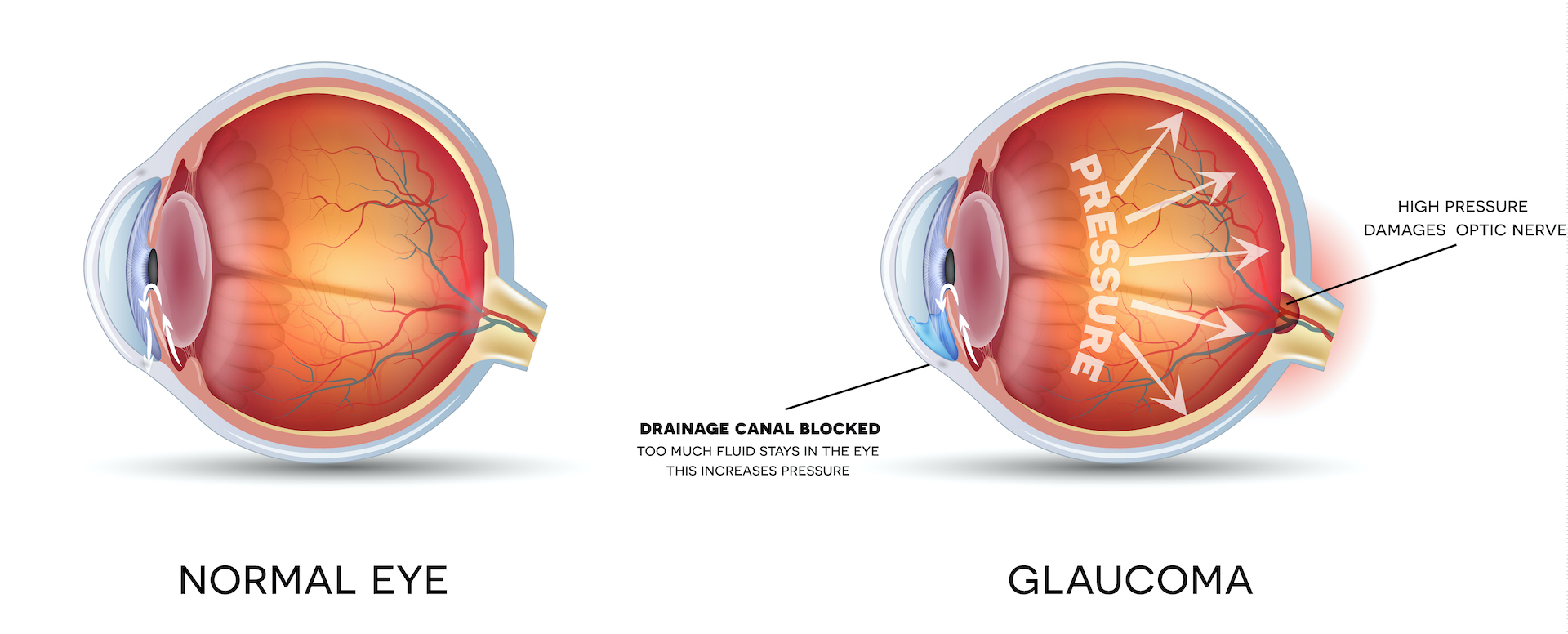Glaucoma

Glaucoma
Glaucoma is the second leading cause of blindness in America. Often called the “Silent Thief of Sight,” glaucoma can damage vision so gradually and painlessly that symptoms go unnoticed until the disease has already reached an advanced stage. When fully developed, glaucoma completely damages the optic nerve. Without treatment, glaucoma can cause permanent blindness. A simple eye exam can often catch glaucoma in its early stages, and prevent blindness before it’s too late. If it has been a while since you or your loved one had a routine eye exam, we encourage you to make an appointment with our glaucoma specialist.
What is Glaucoma?
Glaucoma is the second leading cause of blindness in America. Often called the “Silent Thief of Sight,” glaucoma can damage vision so gradually and painlessly that symptoms go unnoticed until the disease has already reached an advanced stage. When fully developed, glaucoma completely damages the optic nerve. Without treatment, glaucoma can cause permanent blindness. A simple eye exam can often catch glaucoma in its early stages, and prevent blindness before it’s too late. If it has been a while since you or your loved one had a routine eye exam, we encourage you to make an appointment with our glaucoma specialist.

Types of Glaucoma
There many types of Glaucoma, but the two main categories are open-angle glaucoma and closed-angle glaucoma. In open-angle glaucoma, the drainage pathway of the eye (trabecular meshwork and Schlemm’s canal) is open but malfunctioning. In chronic angle-closure glaucoma or acute angle-closure glaucoma, the drainage pathway of the eye is closed and is therefore not functioning. Most forms of glaucoma do not have noticeable symptoms until the disease has caused permanent damage. Although there isn’t a cure for glaucoma, there are treatments available to help the drainage channels of the eye work better or decrease the amount of fluid produced by the eye to keep the eye pressure low.
Glaucoma Treatment
Treatment of glaucoma may be initiated with drops or with a laser. If the patient continues to have progression despite drop regimen and laser, glaucoma surgery may be needed. To discuss whether your glaucoma can be managed with eye drop treatments, or if glaucoma surgery is a more viable method for stopping the progression of the disease, we encourage you to make an appointment with our glaucoma specialist.
Palmer Eye Center is pleased to serve the greater Tallahassee area, and we are an easy commute from the city center as well as the surrounding areas of Monticello, Drifton, Capps, Havana, Quincy, Midway and Woodville, Florida. We invite you to make an appointment with us today so that we can help you pre-screen for, manage, treat, or discuss surgery options for your glaucoma.
Laser Peripheral Iridotomy
Some patients have narrow angles which means that the front part of their eye is crowded, making it difficult for fluid to leave the eye. In these patients, if the angle is left narrow, it may eventually close slowly and cause chronic angle-closure glaucoma or fast causing acute angle-closure glaucoma which is a painful experience that requires an emergency laser.
The treatment for narrow angles and for early chronic angle-closure glaucoma is to perform a laser peripheral iridotomy. Laser peripheral iridotomy is performed in the office. It consists of creating a small hole in the iris. No incision or cut is needed. The procedure takes 5-10 minutes and is not painful. There is virtually no recovery period and the post-operative regimen consists of one drop of steroids 4 times a day for 1 week.
Laser Trabeculoplasty
Glaucoma can be treated with eye drops and/or laser trabeculoplasty. The goal of the laser is to improve the outflow of the eye or make the drainage pathway of the eye work better. The procedure takes 5-10 minutes and is not painful. There is virtually no recovery period and the post-operative regimen consists of one drop of steroids 4 times a day for 1 week.
Unlike cataract surgeries, glaucoma surgeries do not restore or improve visual acuity but aim to stop the progression of the disease. Glaucoma surgery should be offered whenever the risk of visual loss is greater with medical management compared to the intrinsic risk of surgery.
Trabeculectomy with mitomycin C
Trabeculectomy consists in creating a trap door in the sclera (the white part of the eye) to allow fluid to leave the eye in a controlled manner. The fluid accumulates in a “bleb” in the superior part of the sclera and is hidden by the upper eyelid. This aqueous fluid does not drain out of the eye as tears would. Once it accumulates in the “bleb” under the conjunctiva (pink part of the eye), it is drained slowly through conjunctival vessels.
Glaucoma drainage device (Ahmed or Baerveldt tubes)
For some patients, an actual drainage device may be recommended. The drainage devices consist of a tube that enters the anterior chamber of the eye and a reservoir that is placed under the conjunctiva (pink part of the eye). The tubes are usually not visible to others as the reservoir is nicely covered under the upper eyelid. Over time, the fluid from the reservoir is drained through the conjunctival vessels and helps keep the eye pressures low.


